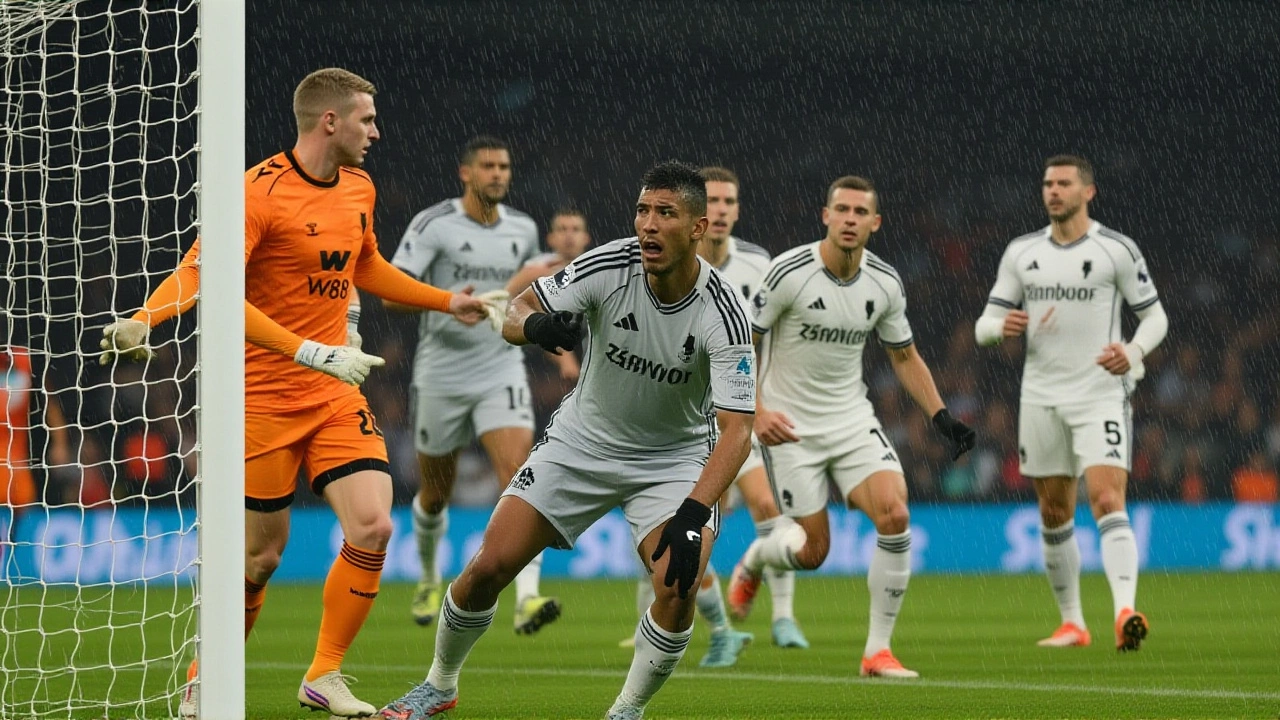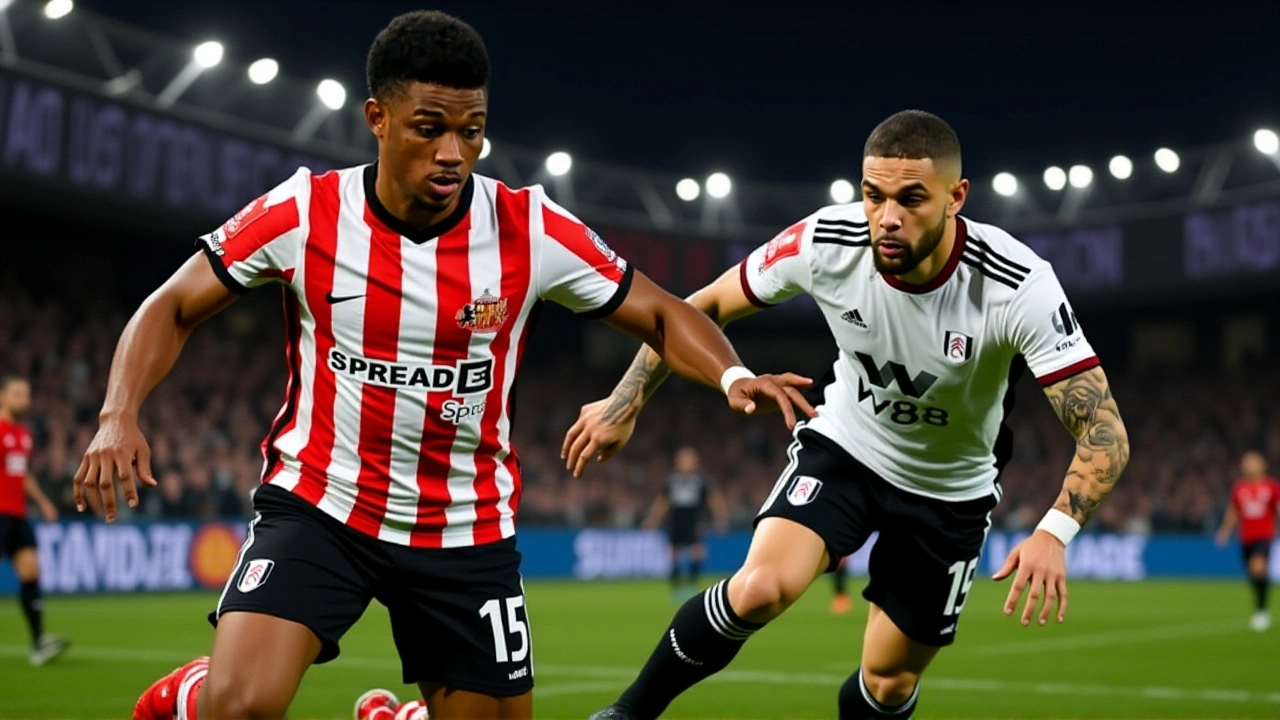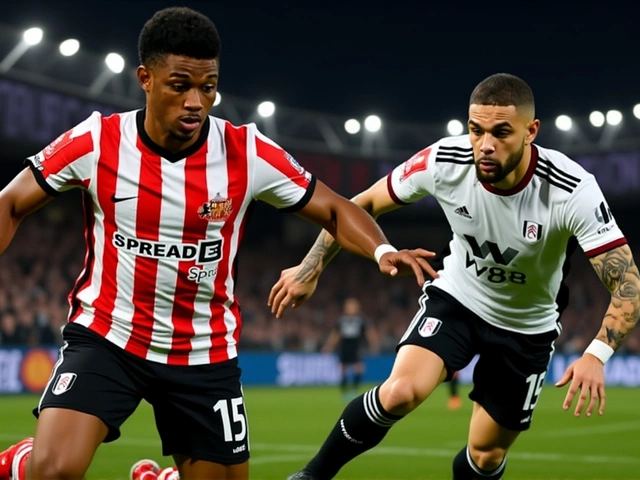It wasn't pretty, but it was enough. Fulham held off a stubborn Sunderland side 1-0 at Craven Cottage on Saturday, November 22, 2025, thanks to a 89th-minute strike from Raúl Jiménez, assisted by João Palhinha. The win, sealed under the flickering London twilight, wasn't just three points—it was a statement. Fulham, now unbeaten in six home league games, extended their grip on the top half of the table, while Sunderland’s promising start to the 2025-2026 campaign took a sharp downturn with their third defeat in 12 matches. The final whistle didn’t end the drama; players had to be physically separated by officials as tempers flared in the chaotic aftermath, a fittingly tense end to a match that told a story far deeper than the scoreboard.
Statistical Domination, Tactical Frustration
Fulham’s numbers told a tale of control: 56.9% possession, 24 shots, 2.16 expected goals. Sunderland managed just four shots and a paltry 0.17 xG. You’d think it was a rout. But football doesn’t play by statistics alone. Sunderland won 43 of 79 duels—54.4% success rate—and outmuscled Fulham in ground battles, winning 29 of 53. They didn’t need to dominate the ball to be dangerous; they just needed to be stubborn. And for 88 minutes, they were.
Marco Silva’s side peppered the box, but goalkeeper Sunderland’s Lee Camp—on loan from Championship side Rotherham—stood tall. His reflex save on Palhinha’s 67th-minute curler was the kind of moment that keeps a team alive. But when Jiménez, the Mexican international, broke free after a poor clearance from Sunderland’s center-back, and slotted low past Camp, the game turned. No celebration. Just a clenched fist, a quick nod to Palhinha, and the weight of expectation settling on Fulham’s shoulders.
A History Written in Draws and Heartbreak
This was the 67th meeting between Fulham Football Club and Sunderland Association Football Club. And for the first time since 2018, Fulham won a league match against Sunderland at home. The historical ledger, per Sportsmole’s November 22 analysis, favors Sunderland: 26 wins to Fulham’s 21, with 20 draws. But the narrative has shifted. In the early 2000s, Fulham won four of their first five Premier League clashes, including a 3-0 thrashing at the Stadium of Light in 2002 under Jean Tigana. Sunderland responded with brutal efficiency—3-1 at Craven Cottage in 2012, 4-1 in 2014. The pendulum swung back and forth like a broken clock.
Now, with Silva’s side showing discipline and clinical finishing, Fulham are reasserting themselves. Silva, who took over in 2021, had never beaten Sunderland in the Premier League—until now. "It’s not about revenge," Silva said post-match. "It’s about building something consistent. This team doesn’t need luck. It needs belief." And belief, it seems, was exactly what they found in the final minutes.
Conflicting Data, Clearer Trends
Here’s where it gets messy. AiScore.com claims Fulham has 10 wins in 26 meetings; FotMob says five wins to Sunderland’s four. The discrepancies? Different timeframes. Some sites count only Premier League games; others include FA Cup, Championship, even wartime fixtures. Sportsmole’s figure—67 total meetings across all competitions—is the most comprehensive. It includes the 2023 FA Cup thriller at the Stadium of Light, where Fulham won 3-2 after trailing 1-0, and the 2015 FA Cup shocker where Sunderland won 3-1 at Craven Cottage. These aren’t just footnotes—they’re emotional landmarks for fans.
What’s clear: Fulham are now 5-1-3 in their last nine meetings with Sunderland. And in the last three at home, they’ve won all of them. That’s not coincidence. That’s momentum.

What Happened After the Final Whistle?
The match ended 1-0, but the tension didn’t. Sunderland’s captain, Callum Doyle, clashed with Fulham’s Antonee Robinson in the tunnel, both players needing separation by match officials. On the pitch, Sunderland fans booed the referee for not awarding a penalty after a handball in the 85th minute—a decision VAR reviewed and upheld. NBC Sports’ Rebecca Lowe, hosting from the studio in New York, described the scene as "frustration and acrimony... players had to be ushered away like children after a playground fight."
For Sunderland, the loss drops them to 10th place. Five wins in their first 11 games now feel like a mirage. For Fulham, it’s a statement: they’re no longer just a team that plays attractive football. They’re a team that wins ugly when they have to.
What’s Next?
Fulham host Liverpool next weekend. Sunderland travel to Brighton—another tough away fixture. But more than results, the question now is identity. Can Sunderland rediscover the grit that once made them Premier League giants? Or are they drifting into mediocrity? And for Fulham, can they sustain this level? Jiménez, 33, is no longer the flash of his Atletico Madrid days. But his composure in the box? That’s timeless.

Behind the Numbers: A Legacy of Rivalry
These two clubs aren’t just rivals—they’re mirrors. Fulham, the West London club with a storied past and recent resurgence. Sunderland, the North East powerhouse that once won the league in 1936 and 1973, now fighting to reclaim relevance. Their matches have always been more than points. They’re about pride, history, and the ghosts of old stadiums.
Remember the 2002 3-0 win at the Stadium of Light? That was Fulham’s first top-flight away win against Sunderland in 80 years. Now, in 2025, they’ve done it again—just not as loudly. This time, it was quiet. Efficient. Cold-blooded.
That’s the new Fulham. And it’s working.
Frequently Asked Questions
How does this result affect Fulham’s chances of European qualification?
The win lifts Fulham to sixth in the Premier League table with 22 points from 12 games—just three points behind fourth-place Tottenham. With five home wins in a row and only one loss all season at Craven Cottage, they’re firmly in the mix for Europa League qualification. If they maintain their current form, a top-six finish is plausible, especially with tough rivals like Everton and Leeds struggling.
Why do different websites show conflicting head-to-head records between Fulham and Sunderland?
The discrepancies arise because some databases only count Premier League matches, while others include Championship, FA Cup, and even wartime fixtures. Sportsmole’s data—26 Sunderland wins, 21 Fulham wins, 20 draws—is the most complete, covering all competitive meetings since 1907. Sites like AiScore and FotMob often limit their scope to the last 15–20 years, which skews the totals.
What role did João Palhinha play beyond the assist?
Palhinha was Fulham’s engine. He made 117 passes with 94% accuracy, won 12 duels, and intercepted seven Sunderland attacks. His positioning allowed Fulham to control the midfield despite Sunderland’s physical pressure. The assist was his only goal contribution, but his defensive work—especially in the 70th minute when he blocked a clear shot on goal—was arguably more valuable.
Why was there so much anger after the final whistle?
Sunderland fans believed a handball by Fulham’s Antonee Robinson in the 85th minute warranted a penalty. VAR ruled it wasn’t deliberate, but replays showed the ball struck his arm at close range. The frustration boiled over because Sunderland had been so disciplined all match—only to be undone by a late goal and a controversial non-call. Players from both sides exchanged words in the tunnel, requiring security intervention.
How does this match compare to Fulham’s historic wins over Sunderland?
The 2002 3-0 win at the Stadium of Light under Jean Tigana was a statement of arrival. The 2012 3-1 home win over Sunderland was a revenge match after years of being outplayed. This 1-0 win is different—it’s the quietest yet most professional. No flair, no drama, just execution. It mirrors the 2017 2-1 home win under Slavisa Jokanovic: a low-possession, high-intensity grind that proved Fulham could win without dominating.
What does this mean for Sunderland’s season?
Sunderland’s 5-2-4 start looked like a revival. Now, with three losses in their last four, they’re in danger of slipping into the relegation zone. Their defense has conceded just 11 goals in 11 games—among the best in the league—but their attack has dried up. They’ve scored only five goals in their last five matches. If they can’t find a striker before the January window, their top-half hopes may evaporate.


